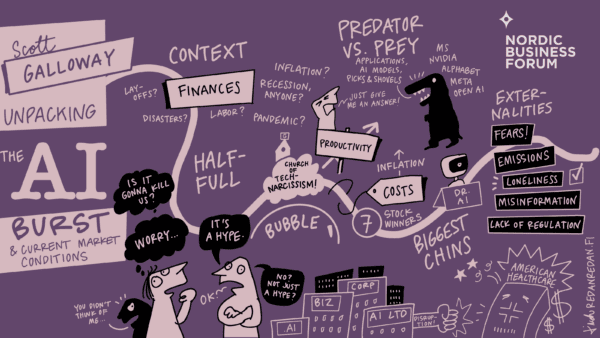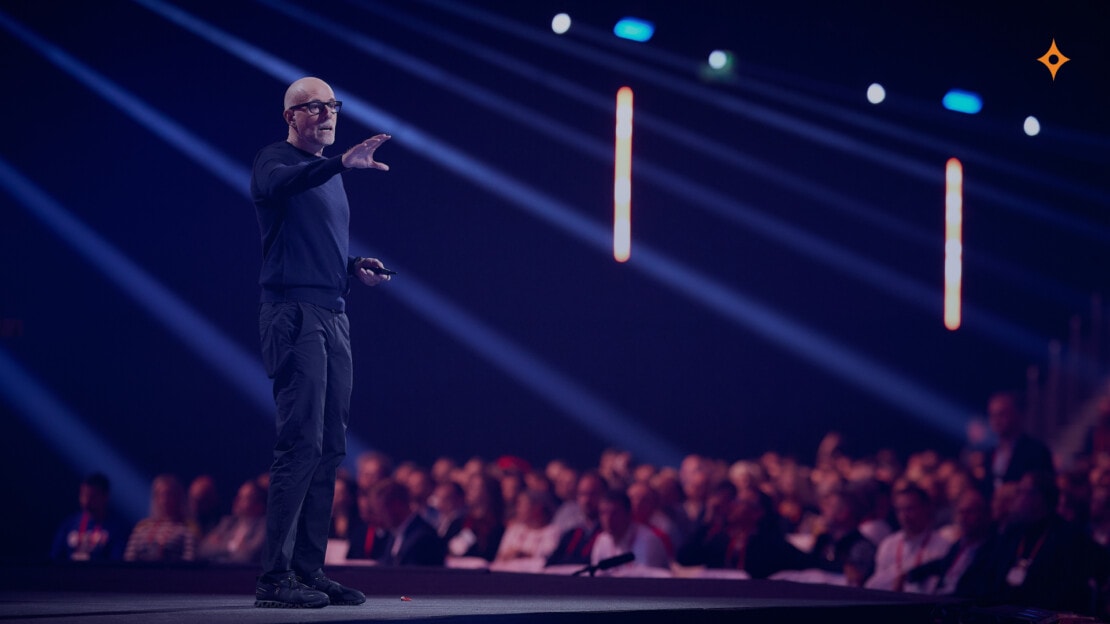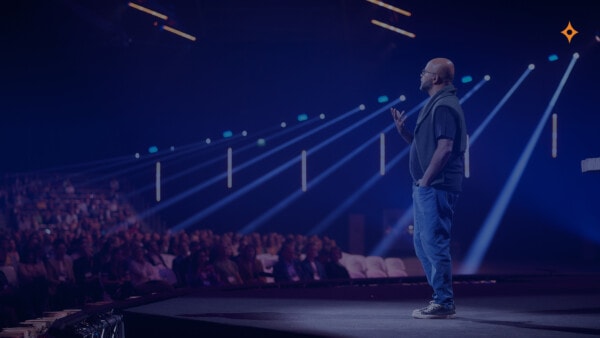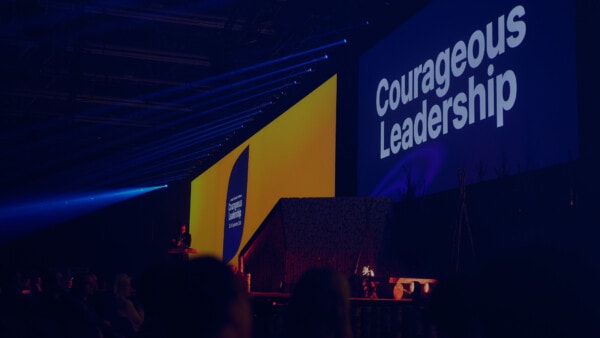6Oct2023
“I’m an AI optimist,” declared Scott Galloway as he made his way into Nordic Business Forum’s main stage. Scott is a serial entrepreneur, the New York Times author of four best-selling books, and a Marketing Professor at NYU. In a fast-paced mood, he jumped into the first topic of his keynote, an overview of the current market context, and predicted that one major economic concern in Europe and the US, inflation, is going to come down dramatically by the end of the year.
Scott also predicted that by Q4 2023, big tech companies will have their most profitable quarters in history, despite the fact that their revenues are decelerating. So far, the NASDAQ in the US has had its best first half in over 40 years, and interestingly, only seven stocks were responsible for 70% of that increase (Meta, Amazon, Google, Nvidia, Apple, Tesla, and Microsoft). Scott left no time to wonder what five of these stocks have in common and quickly stated the promise of AI: “AI has already generated more value in terms of market capitalization in a shorter period of time than any technology in history.”
Opportunities, Winners, and Runner-ups
So, where do opportunities lie? Scott reminded the audience that it is commonly believed that data is the new oil and, if that’s true, “we are drowning in oil.” What we need is more refining, and that’s essentially what AI does. In other words, more than an increasingly huge number of choices, we need fewer and more accurate options, and again, that is what AI, particularly ChatGPT, does. To make this point clear, Scott shared the following numbers: Google returns 11 million answers, somewhere between zero and 99% veracity; ChatGPT, instead, gives you one answer that’s probably 70 or 80% right. “Consumers don’t want 3 million returns in .0005 seconds. They want an answer that they believe is mostly right.”
According to Scott, opportunities lie in building what he called “time machines” that reduce the time it takes to perform some tasks and, consequently, increase productivity. Some examples of massive time-saving machines are shopping at Amazon Grocery, which cuts six days in the grocery store a year, and letting children watch Netflix, which saves 11 days of viewing commercials annually. Under this light, ChatGPT is a powerful time machine that can significantly cut the time devoted to basic technical tasks (like writing a web server in Java or writing professional memos and strategy documents).
Scott classified the AI winners in three groups. The first big winners are in the infrastructure space, companies providing “the picks and shovels.” In the second group he placed the Large Language Models (LLMs) companies. And in the third tier Scott included front-end AI applications firms. The companies in the first group get huge investment initially, and then it works up. “10% to 20% of all revenues generated by LLMs go to the cloud providers, and 80% to 90% of venture capital that goes into new LLM or generative AI applications is spent on cloud services.” But this is becoming an increasingly winner-take-most scenario, where each category has a small number of players that get the greatest part of the benefits. A good example is NVIDIA, a company that accounted for somewhere between 20% and 30% of the NASDAQ’s gain.
On the other end of the “predator-prey” spectrum, Scott explained that the most vulnerable and most disruptable industry in the world is the American healthcare system, which has increased its prices sevenfold, and yet the outcomes have gotten worse. He considered that AI has the opportunity to take healthcare from a defensive disease-driven industry into an offensive health-based industry, together with AI-driven training and motivational tools that tell you what to do to become a healthier person.
Risks and Threats
Next, Scott turned his attention to externalities and grouped people’s biggest fears into four categories: AIs developing their own independent will and acting upon us; power getting concentrated in too few companies and people, and thus rising income inequality and power corruption; massive job destruction; and finally, misinformation. In his view, some of these projections are over-hyped, for example, he argued that machines are not sentient and only pursue the goals we set for them. However, he also considered that some risks are being downplayed and we will eventually experience “an apocalypse of misinformation.”
In addition, Scott pointed out the need for regulation around big tech and the current lack of it. “Regulatory intervention by governments will be critical to mitigate the risks of increasingly powerful models.” Among other things, he suggested changing the incentives and introducing fines that are a percentage of a company’s market capitalization or net worth. For example, a 1 or 5 billion dollar fine to Meta is only 1% of its market cap. “It’s the equivalent of having a parking meter in front of your house that costs $100 and the parking ticket is 25 cents, meaning that we are encouraging them to break the law because the fines, while they sound big to us, are nothing but a gnat or a fly hitting a windshield.”
The Danger of Loneliness
Scott highlighted that there is a great threat nobody is talking about, and that is loneliness, especially in young men. The phenomenon is on the rise as evidenced by the recent spike in searches for AI girlfriends. Other disturbing numbers are that one in seven men no longer have a single friend and one in four men can’t name a best friend. What’s worse, there are fatal effects of estrangement; among other consequences, new research shows that loneliness poses health risks as deadly as smoking 15 cigarettes daily.
Scott wrapped up the central messages of his keynote to investors, stressing that “the safest place is infrastructure. If you want more alpha, find companies at the intersection of healthcare and AI”; to governments, urging them to regulate the AI space; and to citizenry, to consider these matters as they vote in the 2024 elections. In closing, he again called attention to the risks of loneliness as he reflected that going out, meeting new people, and having long-lasting relationships are the hardest but also the most rewarding things in the world.

Visual summary of Scott Galloway’s keynote by Linda Saukko-Rauta


